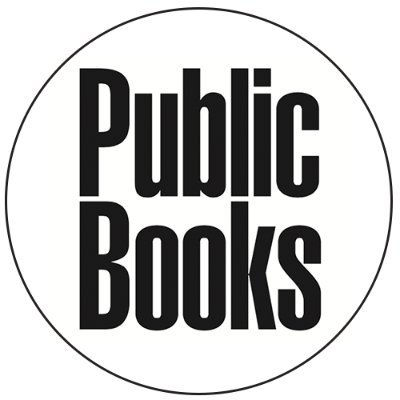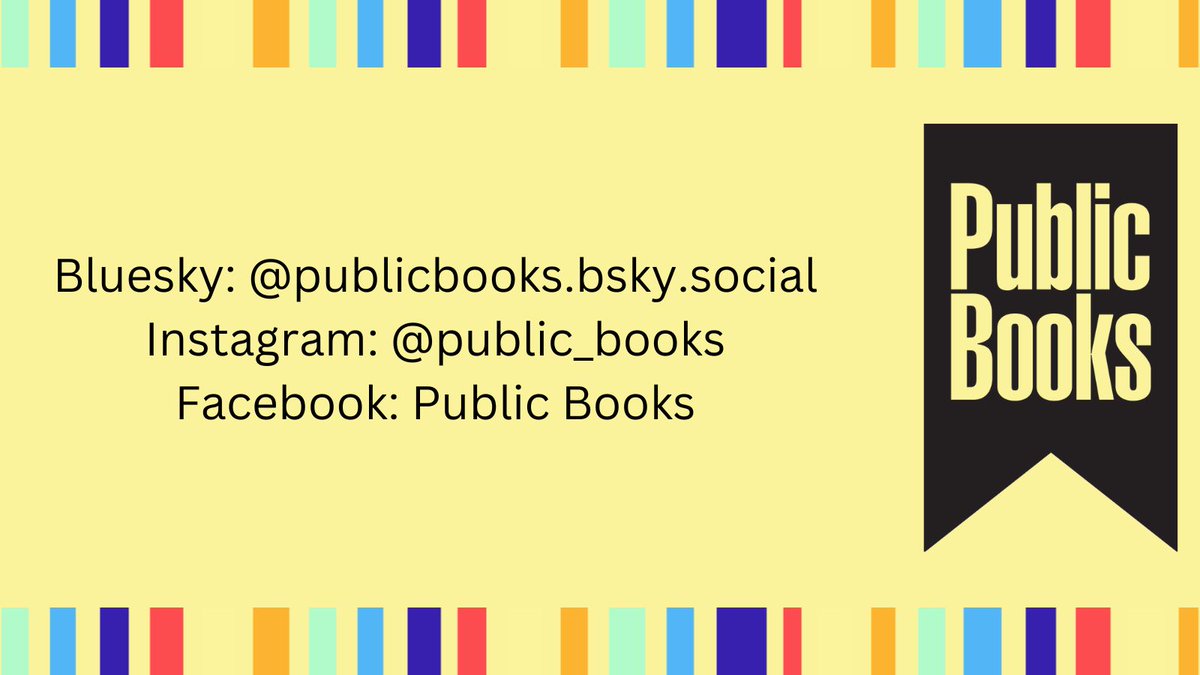
Public Books
@PublicBooks
Followers
19K
Following
6K
Media
6K
Statuses
29K
Public Books is an online magazine of ideas, arts, and scholarship.
Joined January 2012
Want to engage with Public Books outside of Twitter? Follow us on our other channels! . Sign up for our newsletter here: . And follow us on Bluesky (publicbooks) and Instagram (public_books).
1
3
4
In Angelina Eimannsberger’s review of “Digital Social Reading” (@mitpress), she finds serious value in online reading. “Given everything we are up against,” she concludes, “what more joyful yet profoundly argued conclusion could a scholar offer?”.
publicbooks.org
There is an urgent need for new, more affirmative ways to participate in culture, especially against the ongoing systematic whiteness of publishing and the exclusivity of elite institutions.
0
0
1
“Pianzola is among the first scholars who take seriously what people do with books on the internet, about a decade into the regimes of some of the most widely used social media apps and platforms for readers.”.
publicbooks.org
There is an urgent need for new, more affirmative ways to participate in culture, especially against the ongoing systematic whiteness of publishing and the exclusivity of elite institutions.
0
1
1
“These books explore a zone of deep discomfort, not just for their authors, but for their largely bourgeois readers, for whom it’s impossible to read these accounts without a sense of shame.”. Aaron Labaree on the literature of class transition:
publicbooks.org
“When people write about the working-class world, which they rarely do, it is most often because they have left it behind,” admits Didier Eribon, in his 2009 French memoir of class transition ...
0
0
1
“For Ernaux, a bright student in the expanding economy of the 1960s, class defection was a kind of inevitable tragedy. But for Édouard Louis—growing up in the late 1990s and early 2000s—such defection was as dramatic as it was unlikely.”.
publicbooks.org
“When people write about the working-class world, which they rarely do, it is most often because they have left it behind,” admits Didier Eribon, in his 2009 French memoir of class transition ...
1
0
3
“‘Digital Social Reading’ serves as a timely defense (and instruction manual for the academic study) of joyfully reading fiction in one’s free time.”. Angelina Eimannsberger unpacks a new book that argues for inclusive understanding of reading culture.
publicbooks.org
There is an urgent need for new, more affirmative ways to participate in culture, especially against the ongoing systematic whiteness of publishing and the exclusivity of elite institutions.
0
0
1
“The gap between classes—rarely discussed or even thought about by those on its privileged side—is a chasm that those who have crossed must spend the rest of their lives coming to terms with.”. Aaron Labaree on class transition in French literature: .
publicbooks.org
“When people write about the working-class world, which they rarely do, it is most often because they have left it behind,” admits Didier Eribon, in his 2009 French memoir of class transition ...
0
1
3
“In all too many cases the player’s body is understood as a weapon, and the violence and pain is primarily mediated via the tip of the proverbial spear.”. New at PB: Noah Cohan reviews “The End of College Football” (@UNC_Press):
0
1
1
“Anzola suggests that despite fears of very short attention spans and echo chambers, the reading of fiction—broadly and inclusively understood—might actually be experiencing a golden age through social media.”.
publicbooks.org
There is an urgent need for new, more affirmative ways to participate in culture, especially against the ongoing systematic whiteness of publishing and the exclusivity of elite institutions.
0
0
1
Stories of “class transition” have a long history in French literature. Three books by Annie Ernaux, Claire Baglin, and Édouard Louis describe it as “a life-defining rupture, almost an act of violence.”. Read Aaron Labaree’s review, new at PB:
publicbooks.org
“When people write about the working-class world, which they rarely do, it is most often because they have left it behind,” admits Didier Eribon, in his 2009 French memoir of class transition ...
0
0
4
The success of “digital social reading,” argues Angelina Eimannsberger, “comes from garden variety joyful readers—often women—whose taste leans happy and collective rather than serious and consecrated.”. Read her review of “Digital Social Reading”:
publicbooks.org
There is an urgent need for new, more affirmative ways to participate in culture, especially against the ongoing systematic whiteness of publishing and the exclusivity of elite institutions.
0
0
1
“Astonishment at the success of genre bookstores often comes from literary scholars, high-brow amateur readers, and other participants in the upper echelons of culture.”. New at PB: Angelina Eimannsberger on taking genre seriously: .
publicbooks.org
There is an urgent need for new, more affirmative ways to participate in culture, especially against the ongoing systematic whiteness of publishing and the exclusivity of elite institutions.
0
0
0
“Neither Baglin, Ernaux, nor Louis uses the word ‘capitalism,’ ‘exploitation,’ or ‘inequality.’ These books don’t preach liberation. But they are suffused with a sense of injustice.”. Aaron Labaree on 3 books that explore class transition in France:.
publicbooks.org
“When people write about the working-class world, which they rarely do, it is most often because they have left it behind,” admits Didier Eribon, in his 2009 French memoir of class transition ...
0
1
2
New at PB: Angelina Eimannsberger reviews "Digital Social Reading" by Federico Pianzola (@mitpress), arguing that it exemplifies our "urgent need for new, more affirmative ways to participate in culture.".
publicbooks.org
There is an urgent need for new, more affirmative ways to participate in culture, especially against the ongoing systematic whiteness of publishing and the exclusivity of elite institutions.
0
0
0
“The End of College Football” (@UNC_Press) makes a compelling indictment of college football at all levels, arguing the complicity of everyone involved, from universities to coaches and the fans themselves.
0
0
2
“In [these] accounts, the gap between classes—rarely discussed or even thought about by those on its privileged side—is a chasm that those who have crossed must spend the rest of their lives coming to terms with.” .
publicbooks.org
“When people write about the working-class world, which they rarely do, it is most often because they have left it behind,” admits Didier Eribon, in his 2009 French memoir of class transition ...
0
1
3
New at PB: Aaron Labaree reviews three books on class transition: "On the Clock" by Claire Baglin (tr. Jordan Stump), A Man’s Place by Annie Ernaux (tr. Tanya Leslie) and Who Killed My Father by Édouard Louis (tr. Lorin Stein).
publicbooks.org
“When people write about the working-class world, which they rarely do, it is most often because they have left it behind,” admits Didier Eribon, in his 2009 French memoir of class transition ...
0
0
1



